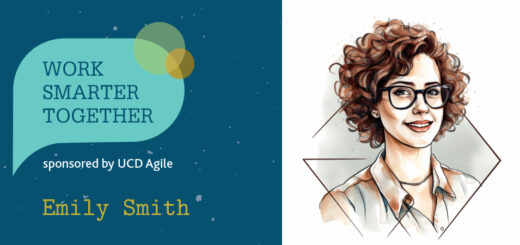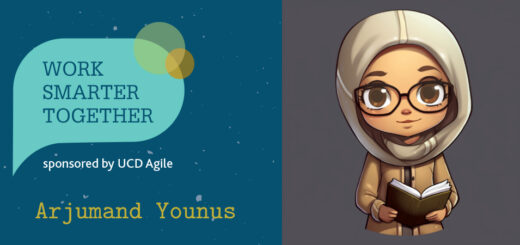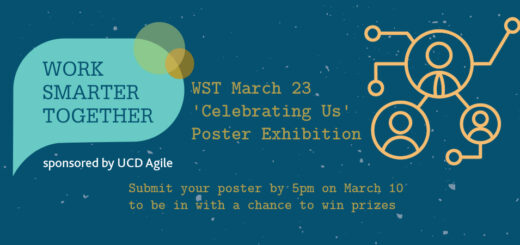A Day in the Life – Mary Staunton
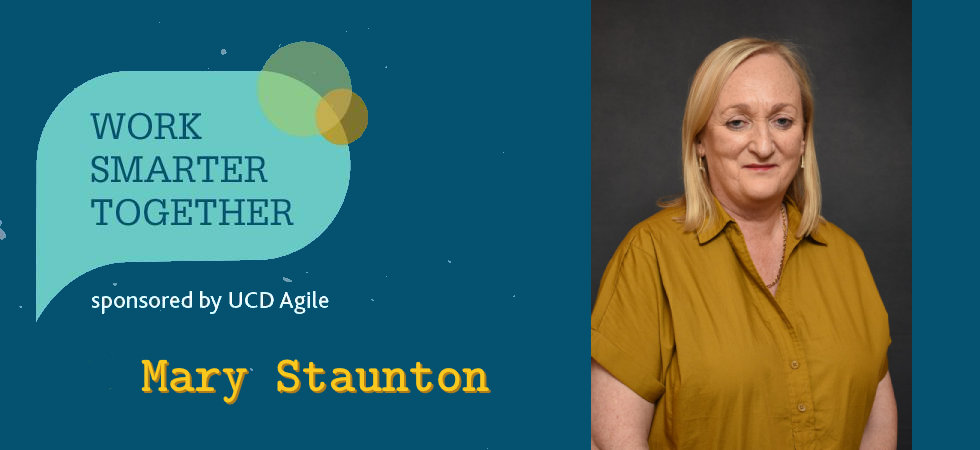
I had the chance to catch up with Mary Staunton, for a Day in the Life interview at the end of last week. It’s difficult not to talk to Mary for exactly as long as she will let you. She’s warm, engaging, hilarious and so inspiring. She told me a little about her journey through cancer and how it influenced her attitude to life. What comes across in talking to her is how willing she is to share stories, laughs, experience and insights. What came across in the editing of this piece is how easy she makes it to share with her. I was easily able to edit out large chunks of myself telling her about me, bantering back and forth and trying to wrangle her help in a myriad of ways (all of which she said a provisional yes to). She has a ‘we’re all in this together’ attitude and a really positive outlook on how we can work together to keep making UCD better that made the interview really enjoyable.
Donna Carroll: Who are you?
Mary Staunton: Mary Staunton.
How did you get here? What was your journey to UCD?
MS: I worked in Bank of Ireland for 25 years and was always interested in writing and editing. Eventually I moved from an operational role into Public Affairs which housed the staff magazine, a job I’d craved for years and loved! And really that was the start of my internal communications journey. It was an exciting time to be in internal comms because it was just starting, growing and evolving. That developed a lifelong interest in comms and events that would continue to grow. I left there in 2006 and took a year out to travel. I came to UCD in 2007 to run the ‘Farewell to the Terrace’ project when UCD left Earlsfort Terrace; that was five days of madness, absolutely crammed with events and chaos. It was just full on, but the best fun with amazing people! If you ever walk the tunnel between Newman and the Library, you’ll see the exhibition panels around UCD’s days in the Terrace, it still looks good and it’s 17 years old at this stage, I’m still so proud of that, it makes me smile when I walk past!
I left UCD for a year, worked in another bank, then returned and took on a few year-long contracts, mostly maternity leave covers – always in comms and events. I had left UCD in 2012 when I was diagnosed with leukaemia and was out of work for two years recovering. I came back again to University Relations on a part-time, maternity leave cover in 2014 and then I was back full-time in 2015, getting more involved in the events and publications side of things.
What is your role within UCD and what are your main responsibilities?
MS: I am based in University Relations, which also houses our marketing and external communication teams. When Triona McCormack was appointed as Vice-President for Strategy and External Engagement in January this year, she asked me to take on the communication around the University’s strategy planning process. Basically, I’m responsible for making sure that a wide range of stakeholders feel that they have had an opportunity to feed into the strategy planning process and have their say. It’s been busy but really interesting, listening to people talk about their hopes for the University’s future.
DC: Are there other responsibilities? You went through a lot of it there, but you also refer to the day job. So tell me about that.
MS: My day job can cover a lot of random things but a key part is to look after a number of University level publications. For example, I look after the President’s regular reports to the UCD Governing Authority. I gather, collate and edit submissions from UMT members and it is approved by the President. Annually in September, I kick off the process for the University’s annual report, which runs to December and again is presented to GA. I also produce UCD Today, our campus magazine, which doesn’t issue as often as I’d like but is a valuable medium for everyone across campus. I’ve always loved writing and editing, even venturing into fiction and some shockingly bad poetry back in the day.
Events also form a huge part of what I do, organising any university level events. I’m involved in organising conferrings; honorary conferrings; Ulysses medal presentations; the President’s inaugural event; and any other significant University celebrations. For lots of other events around campus, I’ll advise people on how to run things, the correct protocol, and a few tips and tricks. I’ve years of experience, and I love sharing that experience with people, working with them to run the best events they can, especially if it’s not part of their role normally. I’m quite prescriptive with people about how protocol works, how important it is to do the right thing in the right place at the right time – it’s so important for our brand and reputation.
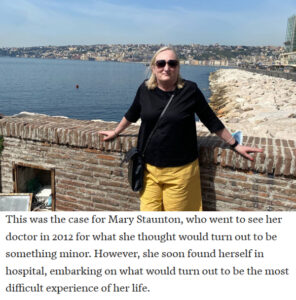
https://www.irishtimes.com/health/your-wellness/2023/06/01/i-had-heard-of-leukaemia-but-had-no-idea-what-it-meant-but-those-words-were-so-chilling/
DC: I think people may not realise when someone like a Government Minister is visiting, they’re not dealing with a friend or a member of staff, they’re dealing with UCD the organisation.
MS: It’s so important that people talk to us and let us know when they have a VIP visitor. If, for example, it’s a Government Minister or CEO of a strategic partner, we must consider what the University overall can achieve out of the visit – we have to exploit all of those strategic opportunities.
What are some of the most interesting or challenging tasks you encounter on a regular basis? Why are they unavoidable? Tell me about them?
MS: There’s always admin! There’s a level of administration in every role, no matter what level you’re at, you have to do your admin. I’m actually a very organised person. I try to operate on as little paper as possible, and I file everything away online. Notebooks are my friend, I make myself a list at the start of every day – what has to be done today? I love to tick off one or two things at the end of the day – never as many as I’d like!
DC: So what would you say is the most interesting thing to you? It seems to be the writing and editing – but is there something else?
MS: I love the feeling when you’re standing at the back of the event, and it’s on, it’s moving, everyone’s turned up, there’s a full hall and you’re thinking “I did this. I made this thing. I made this work” – and that’s a brilliant feeling! The detailed planning that goes on behind the scenes is phenomenal. You have to love it to work in that area. I’m lucky that I’m the right person in the right job. You have to be able to enjoy the thrill of it, while taking all the associated chaos in your stride.
Are there any specific projects or initiatives that you or your unit are currently working on that you would like to share about.
MS: The University’s strategy planning is the big focus right now. It’s so important for the University; this new strategy is about positioning us for the future. It’s the strategy to 2030, but it’s also looking further, it’s looking out to 2040, saying, “What will Ireland be like in 2040, what will it need and how can UCD support that?” We’re taking a broad brush, looking at the internal landscape, the external landscape, the factors that are going to affect the future. The pace of change globally has just accelerated so much. So we have to be more agile, and we have to be able to operate at pace and at speed.
Is there a process or element of your work that you would improve or change.
MS: We’re always looking at ways of improving and changing how we do things. Nothing stays static, and we always look at what’s new.
DC: You’re really open to change. Change is part of the job, really, isn’t it?
MS: Have to be open to it, absolutely, it’s the only constant.
Could you share a memorable experience that you have working in your role?
MS: Immediately, I think of Belfield 50, with Dr Ellen Rowley as academic adviser, a beautiful project that was all kicking off in 2020 and, as we all know, the world changed in 2020. We had to ‘pivot’; we did lots online and I’m really proud of that but we missed out on so many opportunities for those in-person events celebrating what has been a really vibrant 50 years of growth and development. I’d really encourage people to check out the website, it has so many resources – www.ucdbelfield50.com
DC: Amazing. Those photographs are immense. I love them.
MS: Yeah, the exhibition is amazing. As part of the overall project, we wanted to celebrate UCD’s involvement in the Folk Music Revival during the 1970s. With Professor P.J. Matthews as academic adviser, we presented a Ulysses medal, the University’s highest honour to Paul Brady and honorary doctorates to seven other luminaries of the Irish folk music scene. My most treasured photograph in my office is of me and Paul Brady!
That evening, we held a concert in O’Reilly Hall to celebrate the musicians and invited along a UCD student band to support them. The concert was filmed, all on the website!, and it was absolutely brilliant. There were so many moving parts, all the details, really stepping into areas that I wasn’t familiar with but you learn quickly. It was a huge team effort and the feeling watching it was absolutely amazing. So that’s probably my best memory. As part of Belfield 50, we produced a beautiful book as well – Making Belfield.
And speaking of books… as part of the University’s Decade of Centenaries celebrations, we produced Signatories, a play and a book, with Dr Conor Mulvagh as academic adviser. That was really exciting, combining my love of history and theatre. The organisation of that took me way out of my comfort zone as well. I have the posters from Signatories on my wall, as it had been quite challenging at times and anytime I’m struggling with how something is going, I look up at the wall and I think, if I got through that, I got this! It’s using those successes of the past to drive success in the future.
Is there a particular skill or expertise that is key to your role?
MS: Apart from the basic comms and event management skills, it is critical to be flexible, no one event or indeed publication, is the same as another. I think the best advice I would give is, listen, listen to people and write everything in your notebook. Always have a notebook with you. If you’re meeting somebody, just write it all down, and usually with my trusty red pen. Listen to what they need and think about what you can do to support them. Effectively try and bring it together so that everyone’s achieving their objectives. As a wonderful colleague says “we’re all wearing the same jersey”!
How do you collaborate with other teams or colleagues in your day to day?
DC: You’ve been talking a lot about relationship building and maintaining good networks. But at the same time, you’re also one person. It seems to me like those relationships that you built and the network that you have are essential.
MS: Absolutely, relationship building and having a good network is really important. Having trusted contacts to call on when I’m organising an event – I always say it’s not what you know, it’s who you know. Working with teams around campus, we’ll use a Google drive to manage documents, obviously – so everybody has access to the most up to date information at all times. I keep in touch with people, make sure everyone is very clear on their actions, so we are all on the same page, and meet regularly to review everything.
How do you see your job changing over the next 10 or 20 years? Do you think about AI and what they call intelligent augmentation?
MS: Of course, there is always something new on the horizon. What I’ve learned is that change is constant, we need to adapt to whatever new technology comes along, whether it was the advent of the computer back in the day or facing the myriad challenges of AI. When I look at how much things have changed from when I started in the comms business in 1990, it’s really been radical and who knows what the future holds but I do believe that human intervention will always be necessary.
What is an achievement, big or small, that you’ve had in this role?
MS: I was saying earlier about those big events and those big projects that I delivered, there’s just an amazing sense of achievement after those, and I still feel pride in them. But genuinely I do get a sense of achievement every day when I tick something off the list!
If your job had a theme, song, or soundtrack, what would it be, and why?
MS: I thought about this a lot! Panic on the Streets of London… Murder on the Dancefloor… 9 to 5… Manic Monday… but I eventually plumped for the old Gloria Gaynor classic – ‘I Will Survive’. That’s my life anthem as well. I will survive. I’ll keep going. Never give up!

